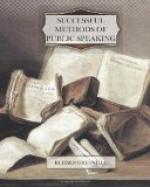Mr. Gladstone did not yield to Walpole in political and parliamentary courage—it was a quality which he closely observed in others, and on which he was fond of descanting. But he had the rarest and choicest courage of all—I mean moral courage. That was his supreme characteristic, and it was with him, like others, from the first. A contemporary of his at Eton once told me of a scene, at which my informant was present, when some loose or indelicate toast was proposed, and all present drank it but young Gladstone. In spite of the storm of objurgation and ridicule that raged around him, he jammed his face, as it were, down in his hands on the table and would not budge. Every schoolboy knows, for we may here accurately use Macaulay’s well-known expression, every schoolboy knows the courage that this implies. And even by the heedless generation of boyhood it was appreciated, for we find an Etonian writing to his parents to ask that he might go to Oxford rather than Cambridge, on the sole ground that at Oxford he would have the priceless advantage of Gladstone’s influence and example. Nor did his courage ever flag. He might be right, or he might be wrong—that is not the question here—but when he was convinced that he was right, not all the combined powers of Parliament or society or the multitude could for an instant hinder his course, whether it ended in success or in failure. Success left him calm, he had had so much of it; nor did failures greatly depress him. The next morning found him once more facing the world with serene and undaunted brow. There was a man. The nation has lost him, but preserves his character, his manhood, as a model, on which she may form if she be fortunate, coming generations of men. With his politics, with his theology, with his manifold graces and gifts of intellect, we are not concerned to-day, not even with his warm and passionate human sympathies. They are not dead with him, but let them rest with him, for we can not in one discourse view him in all his parts. To-day it is enough to have dealt for a moment on three of his great moral characteristics, enough to have snatched from the fleeting hour a few moments of communion with the mighty dead.
History has not yet allotted him his definite place, but no one would now deny that he bequeathed a pure standard of life, a record of lofty ambition for the public good as he understood it, a monument of life-long labor. Such lives speak for themselves, they need no statues, they face the future with the confidence of high purpose and endeavor. The statues are not for them but for us, to bid us be conscious of our trust, mindful of our duty, scornful of opposition to principle and faith. They summon us to account for time and opportunity, they embody an inspiring tradition, they are milestones in the life of a nation. The effigy of Pompey was bathed in the blood of his great rival: let this statue have the nobler destiny of constantly calling to life worthy rivals of Gladstone’s fame and character.




